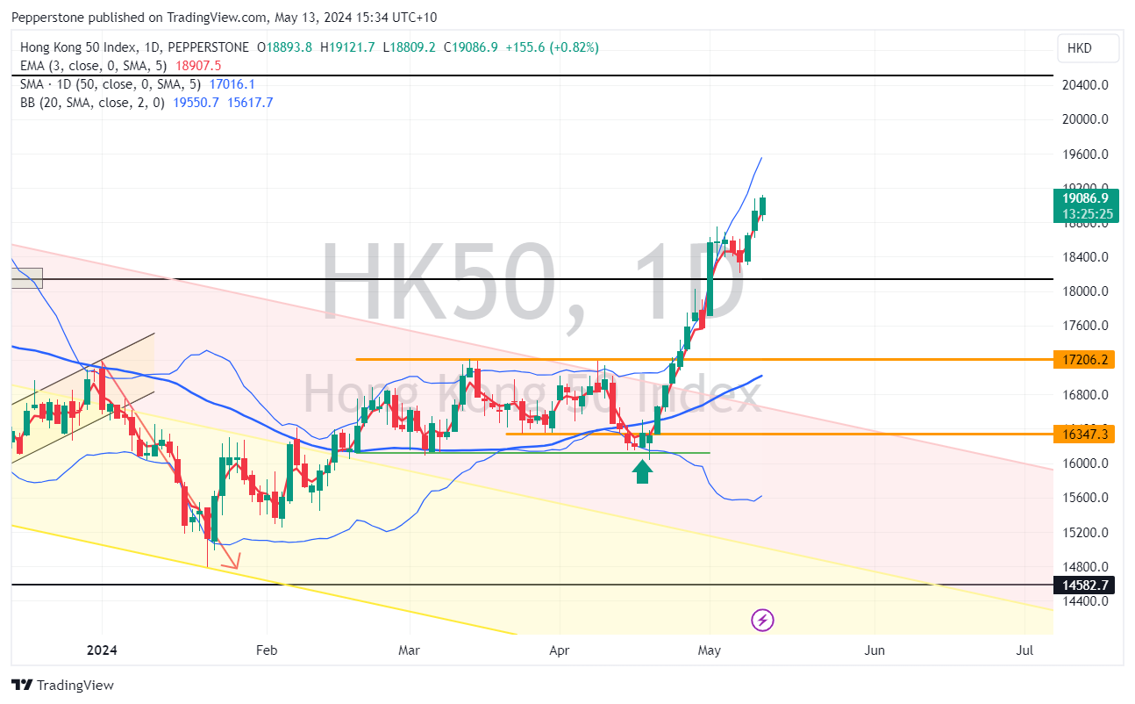- English
- 简体中文
- 繁体中文
- ไทย
- Tiếng Việt
- Español
- Português
- لغة عربية
A glance at the year-to-date daily chart of the HK50 reveals a journey marked by a downturn in January and a subsequent bullish rebound in February. From late February to late April, the index oscillated between 16,100 points and 17,200 points.
However, April 19 marked a pivotal moment in this narrative as bullish sentiment surged, breaching not only the downtrend channel since January 2023 but also surpassing the year's high of 17,200 points. Additionally, it shattered the significant resistance zone ranging from 18,000 to 18,300 points, which had been validated in September, October, and November of 2023.
As of May 10, the bulls have pushed the HK50 up by an impressive 17%, with the index now trading above 19,100 points, reaching its highest level since August 2023. If the bullish momentum persists, the next target of HK50 could be the 20,000 mark.

What's fueling these new highs?
Examining the interest rate outlooks of G10 central banks, with Sweden and Switzerland each having cut interest rates once, alongside the market's dovish repricing of rate reduction by the Fed, which has a next-to-no desire to hike again and looking to cut soon, as well as the anticipated easing by the Bank of England and the European Central Bank in June, have bolstered sentiment in risk markets. This has led to significant gains in both US and European stocks since mid-April, lifting the Hong Kong stock market as well.
In addition, the relatively low valuation of Hong Kong stocks, a more stable exchange rate, and a familiar investment environment for foreign capital are friendly to international capital.
Also, China implemented five policies in mid-April aimed at supporting the Hong Kong capital market. On the economic front, China's trade balance surpassed expectations in April, major cities gradually eased property purchase restrictions, and market rumors circulated about a potential 20% reduction in the dividend tax for Hong Kong stocks — all of which are key positives for domestic investors.
With these factors in place, the uptrend in Hong Kong's technology and property sectors has ignited the bull market in the HK50.
Since April 19, the Hang Seng Tech Index (HSTECH) has soared by as much as 23%, while Tencent has risen by 22% and Alibaba has approached an 18% gain. At the same time, the Hang Seng Real Estate Fund Index (HSREIT) has surged by over 20%.
In summary, the rise in HK50 is the result of a combination of more favorable external market conditions, policy support from China, the recovery of the Chinese economy bolstering market confidence, and the outstanding performance of Hong Kong's technology and property sectors.
Behind the bull market, are there hidden concerns?
Although the HK50 currently appears to be thriving and bullish sentiment prevails, there are still some notable risks to the bull case that have powered the recent sharp rise in the index.
Looking back at China's macroeconomic data, last Saturday's credit prints were disappointing. New loans in April turned negative for the first time since 2005, and the 8.3% YoY growth rate was significantly lower than the consensus expectation of 8.7%, reflecting continued weak credit demand.
Although these lower-than-expected data can be partially explained by regulatory changes and slow government bond issuance, China's announcement today (May 13) of issuing $138 billion in long-term bonds to cover infrastructure construction expenses could mitigate market concerns to some degree. However, the subdued property sales remain a major hidden risk to the Chinese economic revival and the enduring resilience of the Hong Kong stock market.
Although purchase restrictions have been relaxed and property prices have generally declined, with the overall housing price growth rate in March turning negative at -2.2%, there has been no corresponding increase in people's willingness to buy houses: new home sales in 30 major cities were down 39% in April from the same period last year. This raises the question: Has people's purchasing power decreased? Or do people believe that the bottom of the property prices is far from reached?
Whether the market can regain confidence and consumer willingness, and whether the property sector can achieve a "soft landing", are key factors for the continuation and strengthening of the bull run in the HK50.
Chase the Rally or Sell the Bounce: What should we focus on?
From an economic fundamentals perspective, China's April CPI basically met expectations, with a 0.3% YoY growth rate slightly higher than the market's expected 0.2%. Due to base effects, we can expect moderate inflation to continue.
From a policy perspective, the promise made at the end of April's Politburo meeting to "accelerate government bond issuance" has begun to be fulfilled. Monetary authorities have also realized that credit-driven recoveries are not of high quality, and are seeking to rely on exports and the new energy sector to drive economic growth.
I believe this shift is commendable, and the retracement of some macroeconomic data is just part of the transition process. We should still maintain confidence in the Chinese market.
Specifically for the Hong Kong stock market, in the short term, we need to pay attention to the release of the first-quarter earnings reports of several technology stocks this week, including Tencent, Alibaba, JD.com, and Baidu, among others.
Although the breadth of sectors participating in this wave of growth has increased, extending from the internet, EVs, and consumer brands to state-owned enterprises and industrial sectors, undoubtedly, these high-market-cap and fast-growing technology stocks remain the key drivers of the HK50. Better-than-expected revenue and performance guidance could provide significant impetus for the rise of the HK50.
In addition, the one-year MLF rate and the relative economic conditions of China and the United States may also affect the performance of the Hong Kong stock market. Lower MLF rates help attract more capital into Hong Kong stocks, boosting the price of the HK50. While, if the U.S. "exceptionalism" narrative faded, and there is a greater willingness to listen to the "China recovery" story, whether in terms of market sentiment or capital inflows, it would greatly support the performance of the HK equity market.
In the medium to long term, factors affecting the performance of the HK50 are more complex, such as China's economic growth and inflation data, monetary policy and forex stance, new economic growth points, consumer sentiment, and the health condition of the property market.
Overall, the bullish factors are currently dominating, and I’m leaning towards a bullish view of the HK50 in the short term. If Chinese economic data remains robust and there are more positive developments in the real estate market, I would be willing to buy on dips after seeing "higher lows".
Related articles
The material provided here has not been prepared in accordance with legal requirements designed to promote the independence of investment research and as such is considered to be a marketing communication. Whilst it is not subject to any prohibition on dealing ahead of the dissemination of investment research we will not seek to take any advantage before providing it to our clients.
Pepperstone doesn’t represent that the material provided here is accurate, current or complete, and therefore shouldn’t be relied upon as such. The information, whether from a third party or not, isn’t to be considered as a recommendation; or an offer to buy or sell; or the solicitation of an offer to buy or sell any security, financial product or instrument; or to participate in any particular trading strategy. It does not take into account readers’ financial situation or investment objectives. We advise any readers of this content to seek their own advice. Without the approval of Pepperstone, reproduction or redistribution of this information isn’t permitted.
.jpg)



